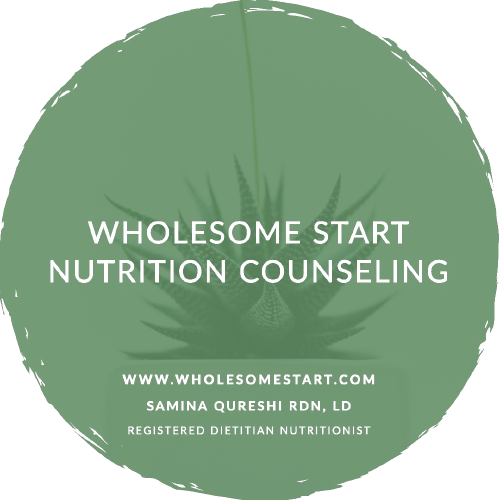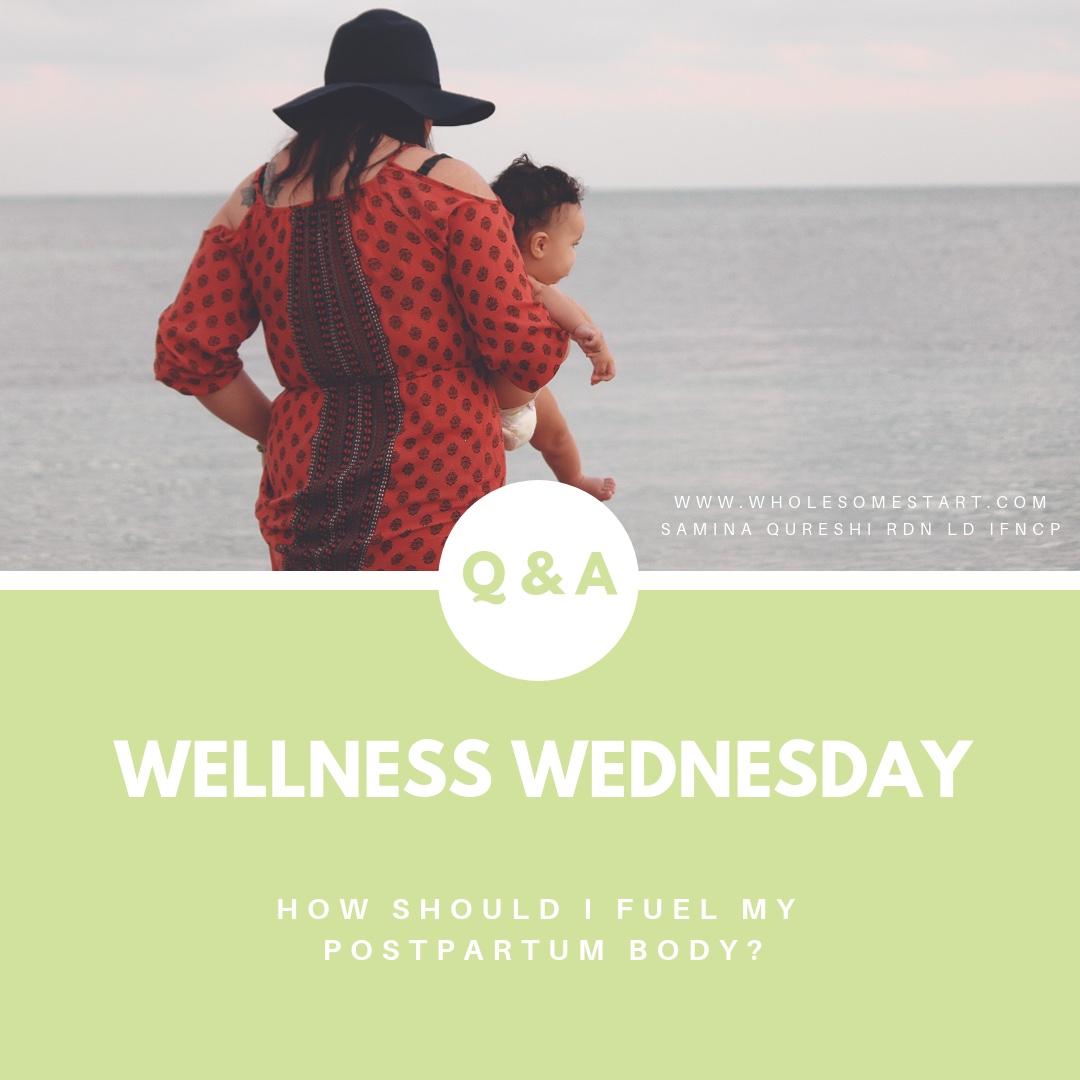Wellness Wednesday: Postpartum Nutrition
wellness wednesday: postpartum nutrition
Samina Qureshi is the Registered Dietitian Nutritionist and owner of Wholesome Start. Her nutrition counseling practice is based in Houston, Texas and she provides virtual nutrition counseling sessions to clients across the country. Schedule your FREE 15-minute nutrition session today!
After giving birth the last thing on your mind are your needs, but nourishing your body is what will help you stay energized and strong to support your health as you care for baby.
Energy needs:
Breastfeeding moms need extra energy to support their milk production. The amount of food you eat should mimic how you were eating during your third trimester with an emphasis on specific nutrients to enhance the quality of your breast milk. If you choose not to breastfeed, no big deal! You still need to provide your body with quality nutrition to focus on replenishing your body’s stores to stay healthy. Each person’s nutritional demands will differ postpartum and it’s important to work with a Registered Dietitian who will provide you with personalized nutrition recommendations that fit your needs.
Protein:
If you’ve had a c-section you will have increased protein needs. A c-section is a major surgery and it will take time for your body to heal, but providing it with adequate nutrition will enhance your body’s ability to recover. Protein helps to keep you full and can help keep your energy levels up by balancing your blood sugar levels. Think about how you can add protein to your meals and snacks! Protein sources include fish, chicken, poultry, beef, pork, turkey, eggs, edamame, tofu, lentils, beans, nuts, seeds, milk, Greek yogurt, soy milk.
Healthy fat:
Keep your heart healthy and boost your breast milk with brain boosting nutrients! Add omega-3 fatty acids to your diet with the following foods: walnuts, chia seeds, ground flax seeds, hemp seeds and cold water fish such as tuna, mackerel, and salmon. Check out last week’s Wellness Wednesday Q&A for more information on why and how you can add healthy fats to your diet!
Fiber:
The best way to increase the fiber in your diet is to enjoy a variety of colorful foods! Foods rich in fiber include vegetables, fruits, whole grains, beans and legumes. Postpartum digestion can be a real pain, literally! You want those bowel movements to be as smooth as possible as your lower body, muscles, incisions and stitches are still healing. Fiber rich foods not only help keep your digestion regular, they also provide you with a boost of essential vitamins and minerals!
Vitamins & Minerals:
Vitamins and minerals support healing, reduce risk of infection, and help maintain and build your bone density. It’s important to include foods rich in iron, vitamin C, vitamin K, calcium and vitamin D into your diet to support your postpartum health. I recommend using a food first approach to meeting your nutritional needs because you’ll be getting more powerful phytonutrients from eating whole foods than from a supplement. Boost your iron stores by eating a meat, seafood, spinach, or beans. When trying to enhance your diet with vitamin C think of adding citrus fruit, broccoli, Brussels sprouts, tomatoes, or bell peppers to your meals. If you want to get the most bang for your buck, eat iron and vitamin C rich foods together for better absorption!
Hydration:
This is no time to forget to drink water! Your body needs the hydration to function at its best to restore your health, keep your digestion moving, and reduce your risk of dehydration. Staying hydrated is especially important for nursing moms because your body is losing considerably more fluid each time you nurse or pump. And remember, every time you increase fiber rich foods in your diet you’re going to want to up your water intake to keep your digestion smooth and regular.
Tips to stay nourished throughout the day:
Convenience is key! Your schedule is going to completely revolve around your new bundle of joy, so you likely won’t have time to make lavish meals or snacks. This is why nutrient rich snacks are going to be your best friend! Keep them in your nursery, diaper bag, backpack, desk, bed side table, etc. to nourish your body throughout the day.
Here are a few examples of balanced snacks:
Fresh fruit + nut butter (almond, cashew, peanut, etc.)
Kindbar/larabar
Glass of milk
Hard boiled eggs + cheese cubes
Dried fruit and nut trail mix
Crunchy veggies (carrots, bell peppers, cucumbers) + hummus
Cottage cheese + fruit
Greek yogurt + walnuts
Mini whole wheat bagel with nut butter
Bagel sandwich made with turkey, cheese, and spinach
Overnight oats
String cheese + dried fruit
Edamame
Don’t be afraid to ask for help! Ask for your partner, family, and friends to help by bringing you one-pot or casserole type meals that can be stored in the freezer for when you come home from the hospital! You’ll be adjusting to your new life as a parent and likely won’t have time to think about your needs. If you’re expecting and want to plan ahead you can always make a few freezer meals in advance!
Supplements:
I like to think of supplements as insurance for when your meals and snacks don’t include a variety of nutrient-dense foods. Supplements are meant to fill in the nutritional gaps of your diet. They are not meant to be used as a means to meet all your nutritional needs-- that’s what delicious food is for! Continue taking your prenatal vitamins or switch to a postnatal vitamin. Try to eat a variety of colorful fruits and vegetables to support your body’s demands and help you restore your body’s nutrient stores. Always consult with your primary care practitioner before taking any supplements to look out for any drug-nutrient interactions that can cause harm to you or your baby. Not sure which vitamins are right for you? Ask your Registered Dietitian, Samina, for a vitamin and mineral recommendation!
Disclaimer: The information and other content provided in this blog, or in any linked materials, are not intended and should not be construed as medical advice, nor is the information a substitute for professional medical expertise or treatment. Please consult with your healthcare practitioners before undertaking any changes in your diet or adding in any supplements.
If you’re ready to feel your best, schedule your complimentary 15-minute consult with our Registered Dietitian, Samina, today! Samina provides virtual nutrition counseling sessions to help you discover the root cause of your health concerns, develop a healthier relationship with food and body image, and unlock your healthiest self. During your sessions you will have the opportunity to share your unique wellness journey and work with her to develop a personalized nutrition care plan that fits your needs. Begin your Wholesome Start today!
Be the first to know about the latest Wellness Wednesday Q&A by joining the Wholesome Start Tribe! If you have a burning nutrition or wellness question, feel free to submit it in the comments below!

